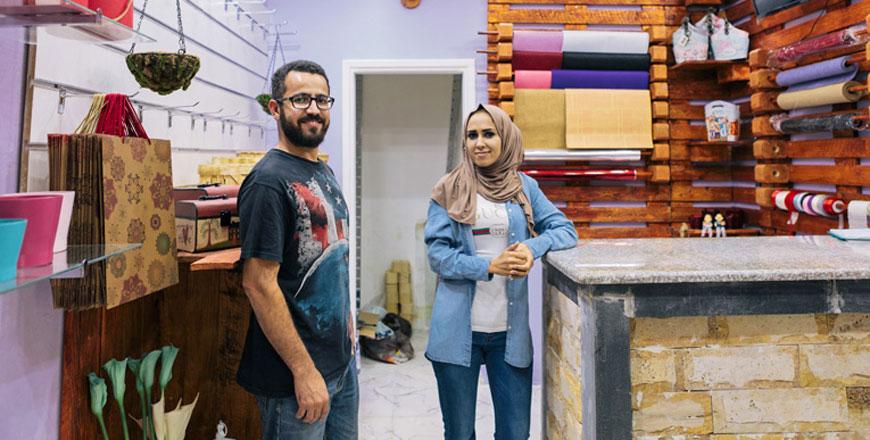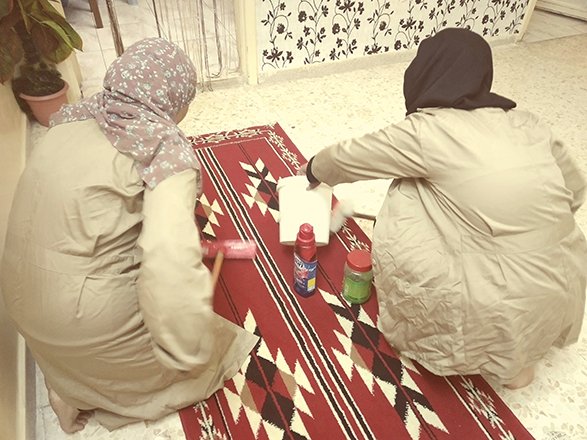You are here
Ordering flowers in sign language: vocational project empowers small businesses
By Camille Dupire - Oct 07,2018 - Last updated at Oct 07,2018

Jordanian friends Asmaa and Hussam, who are both deaf, developed an app using pictures and sign language to sell their flower shop products (Photo courtesy of FCA)
AMMAN — Eager to start their own local business in spite of their disability — both friends are deaf — Jordanian Asmaa and Hussam last year took part in TAREEQI, a tailor-made vocational and entrepreneurship training project set up by the Finn Church Aid (FCA) to improve employment and small-scale entrepreneurship across Jordan.
An 18-month programme run in partnership with the Vocational Training Corporation and the Finnish-based Mercuria Business College, TAREEQI (“My Way” in Arabic) focused on marginalised refugees and host community members, with a special attention dedicated to women and people with disabilities (PWD).
”We are developing an application that works through a flat-screen television and allows us to communicate with our customers, because there are very few sign language interpreters in Jordan,” explained Asmaa, who started a flower shop business with Hussam in their neighbourhood.
The two friends were part of the 424 refugees and Jordanians who completed the vocational training programme as of late September, 49 of whom have already established businesses, with some even employing other community members.
“FCA’s work is rights-based, which means that our operations are guided by equality, non-discrimination and responsibility. It has been encouraging to work alongside women and PWD through this project,” FCA Regional Director for the Middle East Ashraf Yacoub said, noting that, in total, over half of those who have started businesses are women and 10 per cent are PWD.
According to the latest Department of Statistics data, only 13.2 per cent of women were economically active (seeking work, whether employed or unemployed) in Jordan in 2016, compared with 58.7 per cent of men. One of the main reasons for this staggering low number, which places Jordan as counting the 16th highest women unemployment rates among 217 countries, includes the lack of daycare at workplaces, the figures showed.
Aware of this challenge, FCA offered childcare services near the training locations, in cooperation with the Finnish aid organisation Fida.
Wazirah, a Syrian widow who participated in the training, said it gave her “confidence, knowledge and skills” and allowed her to now provide for her family and give her son an education.
”This project was a step out of my comfort zone, I feel stronger now,” she stressed out.
Holistic support
Syrian refugees were also a big focus of the recently concluded programme, which, in addition to vocational training, offered compact entrepreneurship courses through the Mercuria Business College, with a training period, mentoring and a small start-up grant.
“Before the training started, a marketing survey was conducted to find out which branches had the need for labour and which skills employers valued,” a FCA statement explained, noting that the biggest demand was for carpenters, electricians, mobile phone repairers, construction assistants, hotel and restaurant workers and tailors.
But, due to existing restrictions on refugees’ employment in Jordan, Syrians attending the courses began partnering with fellow Jordanians to start joint business ventures.
”It’s good to build a business with a Jordanian partner. Unfortunately, there is no law or official document to corroborate my right to own a business. I’m constantly worried of losing my business,” expressed one of the Syrian entrepreneurs involved in the project.
To address this issue, FCA has been cooperating with other international NGOs to advocate for a clear legal framework for joint business ventures in Jordan. “This would allow Syrians to work as entrepreneurs with Jordanians as equal partners and to benefit the Jordanian economy,” FCA said.
Another beneficiary of the training, Jordanian Ibrahim Milhem, had been unemployed for a long while, despite his strong qualifications as an engineer.
"I started a hydroponic plantation, producing vegetables and flowers on my brother’s rooftop," he explained, pointing out that the hydroponic plantation, which functions with the help of a pump in the tubes in which the plants have been planted, saves about 80 per cent of water compared to regular growing by circulating water.
For a country like Jordan, which has been dubbed as the fourth most water scarce country in the world, such solutions are essential and cost effective, benefiting both the entrepreneur and the Kingdom as a whole.
The project was funded by the European Regional Development and Protection Programme for the Middle East, supported by the EU, the Czech Republic, Denmark, Ireland, the Netherlands, Norway, Switzerland and the United Kingdom, the FCA statement said.
Related Articles
The Vocational Training Corporation (VTC) announced Tuesday in a press statement that the Pharmaceutical Centre of Excellence (PCOE) in Salt, in close collaboration with the Jordanian Association of Pharmaceutical Manufactures and the Employment-Technical and Vocational Education Training (ETVET) fund, is offering professional training, initially for a one-year technical diploma in manufacturing operations in production units.
AMMAN — When two women residing in a northern village decided to open a home dry clean project, they contributed in enhancing the lives of t
AMMAN — Agriculture Minister Khalid Hneifat on Thursday checked on a youth training project on green entrepreneurship and agriculture techno












